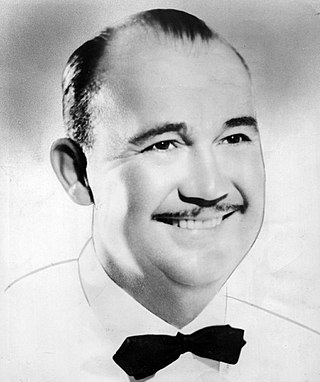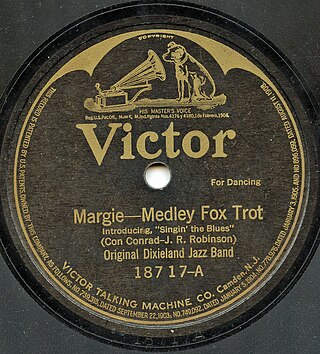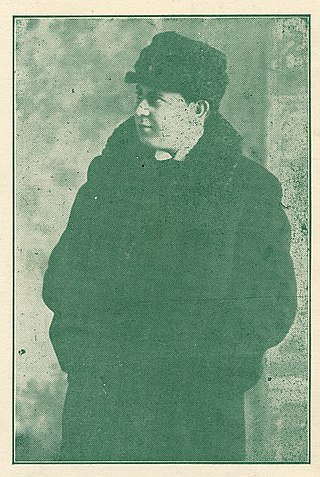Related Research Articles

The Original Dixieland Jass Band (ODJB) was a Dixieland jazz band that made the first jazz recordings in early 1917. Their "Livery Stable Blues" became the first jazz record ever issued. The group composed and recorded many jazz standards, the most famous being "Tiger Rag". In late 1917, the spelling of the band's name was changed to Original Dixieland Jazz Band.

William Christopher Handy was an American composer and musician who referred to himself as the Father of the Blues. Handy was one of the most influential songwriters in the United States. One of many musicians who played the distinctively American blues music, Handy did not create the blues genre but was the first to publish music in the blues form, thereby taking the blues from a regional music style with a limited audience to a new level of popularity.

Paul Samuel Whiteman was an American bandleader, composer, orchestral director, and violinist.

This is a list of notable events in music that took place in the year 1929.

This is a list of notable events in music that took place in the year 1928.

This is a list of notable events in music that took place in the year 1927.
This is a list of notable events in music that took place in the year 1926.

Irving Milfred Mole known professionally as Miff Mole, was an American jazz trombonist and band leader. He is generally considered one of the greatest jazz trombonists and credited with creating "the first distinctive and influential solo jazz trombone style."
"Potato Head Blues" is a Louis Armstrong composition regarded as one of his finest recordings. It was made by Louis Armstrong and his Hot Seven for Okeh Records in Chicago, Illinois on May 10, 1927. It was recorded during a remarkably productive week in which Armstrong's usual Hot Five was temporarily expanded to seven players by the addition of tuba and drums. Some scholars have suggested that a key melodic figure in "Potato Head Blues" was picked up by Hoagy Carmichael for "Stardust." Its musical composition entered the public domain on January 1, 2023.

Orie Frank Trumbauer was an American jazz saxophonist of the 1920s and 1930s. His main instrument was the C-melody saxophone, a now-uncommon instrument between an alto and tenor saxophone in size and pitch. He also played alto saxophone, bassoon, clarinet and several other instruments.

Harry Barris was an American popular singer and songwriter. He was one of the earliest singers to use "scat singing" in recordings. Barris, one of Paul Whiteman's Rhythm Boys, along with Bing Crosby and Al Rinker, scatted on several songs, including "Mississippi Mud," which Barris wrote in 1927.
This is a list of notable events in country music that took place in the year 1931.
This is a list of notable events in country music that took place in the year 1927.
This is a list of notable events in country music that took place in the year 1925.
This is the discography of recordings by Duke Ellington, including those nominally led by his sidemen, and his later collaborations with musicians with whom Ellington had generally not previously recorded.
Joseph Anthony "Fud" Livingston was an American jazz clarinetist, saxophonist, arranger, and composer.

"East St Louis Toodle-Oo" is a composition written by Duke Ellington and Bubber Miley and recorded several times by Ellington for various labels from 1926–1930 under various titles. This song was the first charting single for Duke Ellington in 1927 and was one of the main examples of his early "jungle music". This composition was covered by Steely Dan on their 1974 album Pretzel Logic.
Black Beauty is a 1928 jazz composition by Duke Ellington. According to Ellington scholar A.H. Lawrence, the composition originated as a solo piano piece titled "Firewater" that Ellington played at the Cotton Club at the end of intermissions, as his band members returned to the stage. After he orchestrated and recorded the tune, he decided the title did not suit the work. He renamed the piece "Black Beauty" and dedicated it to singer, dancer, and comedian Florence Mills, who had died the previous year. It became one of Ellington's signature songs. Ellington first recorded it in March 1928 with his orchestra—initially for the Brunswick label under the name "The Washingtonians", and then again a week later for the Victor label under the name "Duke Ellington & His Cotton Club Orchestra". Sixth months later, Ellington recorded a solo piano version for the OKeh label. Ellington recorded the song in the studio on several later occasions, the last being a small group version made for the Columbia label in 1960.

"Singin' the Blues" is a 1920 jazz composition by J. Russel Robinson, Con Conrad, Sam M. Lewis, and Joe Young. It was recorded by the Original Dixieland Jass Band in 1920 as an instrumental and released as a Victor 78 as part of a medley with "Margie". The song was released with lyrics by vocalist Aileen Stanley in 1920 on Victor. In 1927, Frank Trumbauer, Bix Beiderbecke, and Eddie Lang recorded and released the song as an Okeh 78. The Trumbauer recording is considered a jazz and pop standard, greatly contributing to Frank Trumbauer and Bix Beiderbecke's reputation and influence. It is not related to the 1956 pop song "Singing the Blues" first recorded and released by Marty Robbins in 1956.

Joseph Feldman, also known as Joe Feldman, was a Yiddish language tenor, Yiddish Theatre actor, and composer who recorded numerous theatre and comedy songs between 1916 and 1927.